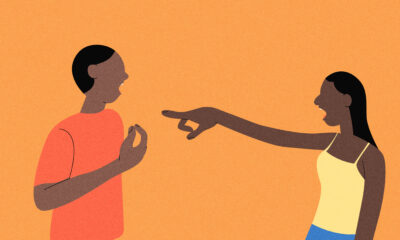Features
Rejoice Abutsa: Are You Invading Someone’s Life with Your Social Media Use?
 There is a trend that has taken over the internet and it has a lot to do with invading people’s private space.
There is a trend that has taken over the internet and it has a lot to do with invading people’s private space.
These days cameras are very active capturing people’s private space and making it public. Assumptions from unknown handlers are used as testament of human behavior and to dent people’s personalities. Moments that are shared in private make it to the public, for the sake of likes, followers and to remain on top of attention.
Handlers go around picking pictures of others, passing it off as theirs and accompanying it with stories that are shameful, sometimes very extreme or those that will elicit calculated reactions. While these stories might be true to the person posting, it does not belong to the face you see. By doing that, they promote false perception of unsuspecting individuals, while protecting themselves.
Social media is an essential symbol of the millennial age. The development it has brought to the world has created a revolution in how we live our lives. It has transformed communication systems and has made us more independent in the way we seek knowledge. It is responsible for reducing unemployment across the world; it has created exemplary systems in how we curate culture.
When we think of social media, we consider the technology that has enabled an advancement in communication, we consider the excitement it has brought to our lives. However, we forget that social media is human relationship. Human relationship thrives on love, respect and understanding, but once our data is on, we forget the essence of this.
A technology that was developed to make our lives better has been misunderstood and misused. We have transformed it as a medium of invading the private space of others. It has become a weapon to aid anger, spread lies, slow compassion, silence truth and amplify vulnerability. Creators of this technology have also trampled on trust by extracting personal information to aid whatever brings them more riches.
Recently, a stranger tried to record me at a restaurant. I was eating and there was a phone strategically placed, to record the moment. Someone saw this and drew my attention to it. The stranger was stunned that anybody will be angry that they are being recorded. The only reason I got for the invasion was that: He wanted to compile a comedic video of how different girls eat at restaurants, and because 25, 000 people follow the page it would have been posted to, it is a good deed.
Ironic? Welcome to the world of privacy invasion!
After the incident, I reached out to a few friends to know, if anyone has trampled on their privacy for the sake of social media.
The stories that came forward prove that the concept of personal space and privacy is becoming a myth, in this age of social media use.
Some of the stories include: A school mate who had her private photos leaked by someone that wanted to use her phone for a call. The intruder took her phone and leaked private photos directly to her social media page. Someone else had a wardrobe malfunction that was recorded by a passer-by and passed to a popular Instagram gossip page where she was mocked and used as an example of “a slay queen with lost priorities”.
There is also a story of a young man who had been gearing for the pre-employment phase for a dream job. When he got to the last phase, he was rejected because a close friend made some damaging claims about him on social media. While these claims were unverified and he claims that the accuser apologized for spreading lies on social media, the apology came in private. By the time the story was shared online, it traveled too quickly and potential employers dug, they found it and did not give him a chance.
Another case of privacy becoming a myth: a friend talked about how offended she was that a chat she had with someone in private was shared online. Even though nobody could identify that she was part of the exchange, she felt tortured by the comments from the “social media jury”. It also hurt her that the person who released the chat had conveniently cut out important information, to make her look stupid and to have a trending story.
Since the internet became well received, it has become difficult to decipher the fake from the real. Even videos are manipulated to suit untrue narratives at the expense of human lives. Anyone with an anonymous page can be an authority on the news. An anonymous account can share events that are untrue and make it look like the true state of things. Random people have put the lives of others at risk, and for that, they have enjoyed growth in followers.
While it is true that many random people are extreme with the use of social media, some of us that think of our innocence in this, contribute to the problem without even knowing it.
I watch many vox pop videos where people, who are eager to share their view on a topic, become subject of online spectacle. While it makes for good humor, do we consider those in these videos and how implicating it is to them in the long run? They give permission to be recorded which makes the case quite different; but they do not trust us with this permission because they want to look stupid on camera.
Personally, I have shot vox pop videos and got outrageously hilarious content, but after going back to these videos and thinking of the moments before creating them, I understand that these people were caught in the moment and it was not in my place to put out their faces or their flaws out to the public in that manner. I always think of myself, far from perfect, being interviewed on a topic I have no idea about. It is so easy to say, I will say to the interviewer “no comment”, but what if I don’t and the video is spread online? What if my face becomes a symbol for the girl that couldn’t answer something that the rest of the world knew?
Going into digital marketing also improved my attention on how for content, we trample on human emotion. The first time I ever felt the rush to do better was when I needed to push a service using memes on a social media page. I had to search images that matched the short captions we wanted to use to generate humour.
When I visited the web page where the photo came from, I found that it was a picture taken from the Rwandan genocide. The pain that has not left a people for over 10 years was almost used for internet excitement. It was a lesson to use caution, especially as it relates to the internet.
If you are concerned about the dynamics of communication and how the bad is quickly creeping over good, you must be intent on being the good person on social media. You must simply question what you see and how you participate in it. Being entertained is important but being cautious about the emotion of the next person is equally important.
The good people must decisively overwhelm the intruders with good and true information. As a society, the duty rests on our shoulders to engineer our place and lifestyle. Our society is becoming increasingly aware and influenced by what happens on social media and this makes it important to tread carefully.
Photo Credit: © Rawpixelimages | Dreamstime.com
























